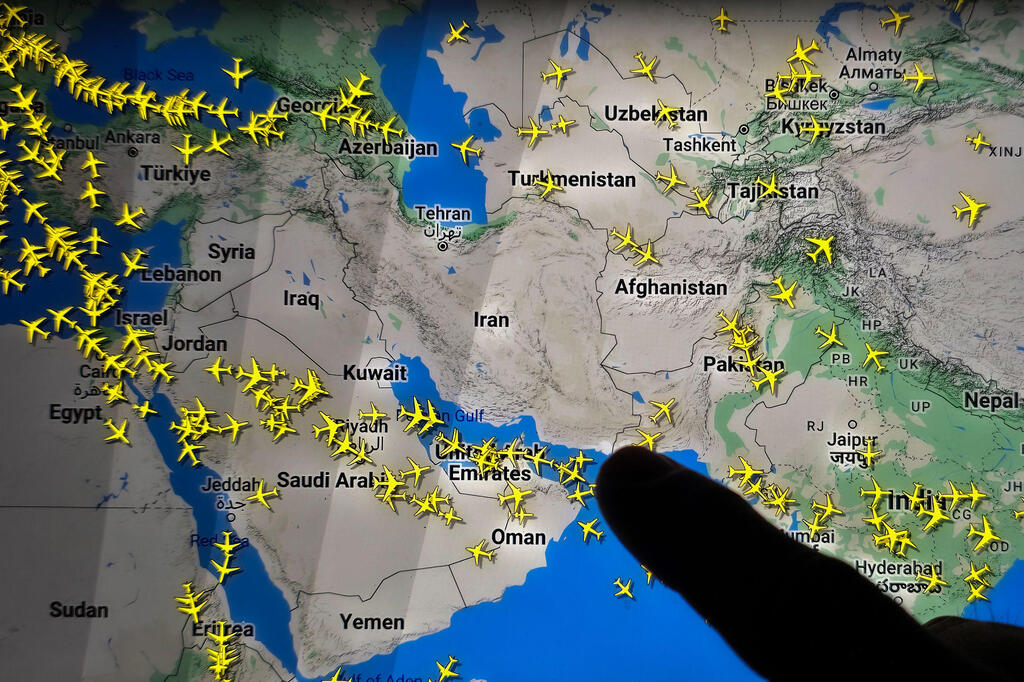Getting your Trinity Audio player ready...
On Saturday morning, around 11:00 AM, Iranian military acknowledged two soldiers were killed in the Israeli attack, one of whom held a rank equivalent to a major. Almost simultaneously, Sky News Arabic reported that Iran communicated to Israel, via a third party, that it had no intention of retaliating. If this report is accurate, it suggests that Israel's strategy was effective.
Damage in a UAV manufacturing plant
This operation was described as a larger-scale response compared to the one Israel launched in April, during which Israeli forces struck central Iran, and Iranian officials claimed no damage was caused.
The Wall Street Journal reported that, hours before the attack, Israel sent a warning to Iran through Arab and European intermediaries. This warning detailed the targets Israel intended to strike and indicated any Iranian retaliation would be met with even stronger subsequent attacks.
Meanwhile, "Nour News," affiliated with Iran's Revolutionary Guards, stated that "Tehran’s policy regarding the Israeli attack is to respond without haste. Israeli aggression cannot be ignored." The Tasnim news agency reported that "Iran reserves the right to respond to any aggression. Israel will face a proportional response to any action." Conversely, the Lebanese network "Al-Mayadeen" claimed, "The confrontation ended with a victory for Iran. The resistance against Israel has established a new equation in the region."
In the meantime, Iranian Foreign Ministry issued a statement asserting that "Iran is entitled and committed to defending itself against external aggressive actions."
So far, local media have been broadcasting images of normalcy from various cities across Iran this morning, including Mehrabad International Airport in Tehran, which was reportedly attacked. Iranian networks have mocked the Israeli attack, distributing videos of residents dismissing the threat, as well as a video comparing the Iranian attack on Israel to the Israeli attack on Iran.
The only documented evidence of the attack's damage was broadcast by the Qatari channel "Al-Arabi," showing the destruction in the city of Shamsabad, south of Tehran, as a result of the Israeli strike. According to reports from media associated with the Iranian opposition, the target was an "industrial innovation" factory in the city, which might produce drones.
Business as usual at Mehrabad Airport
Additionally, Iranian sources informed The New York Times that among the sites attacked in Tehran province was an S-300 air defense battery at Imam Khomeini International Airport. According to these sources, this battery provides protection for parts of Iran's capital. They also claimed that at least three missile bases belonging to the Revolutionary Guards were damaged in the Israeli attacks, adding that "drones attacked the secret military base at Parchin on the outskirts of Tehran. One hit the base, while others were shot down."
Our analyst, Ron Ben-Yishai, highlights that in the Parchin area, Iran has previously conducted experiments intended to enable the production of nuclear weapons—the nuclear explosive device. There is no solid evidence indicating that Iran has resumed efforts to develop a nuclear warhead, but if the reports of the Parchin facility being attacked are accurate, the goal appears to have been to disrupt Tehran's ability to conduct experiments that would advance it in producing a nuclear bomb, should it decide to do so.
Officially, Iranian officials remained silent this morning, with Vice President Mohammad Reza Aref merely posting on social media that "Iran's strength humiliates the enemies of the homeland."
"Impact comparable to hitting Rafael's missile production line"
According to the IDF, during the night, Israel conducted three separate waves of attacks targeting missile production facilities, surface-to-air missile systems, and additional aerial capabilities in Iran. Despite Iranian mockery, Israeli sources asserted that "Iran is trying to claim that the explosions were due to their successful air defense. This is false. They were a complete failure with zero interceptions."
Israeli assessments suggest that Tehran is expected to respond to the strike, though the nature of this response remains unclear. An Israeli source familiar with the details stated, "The intelligence provided by the Military Intelligence Directorate in this event is like science fiction, far beyond imagination. The strike precisely targeted factories producing surface-to-surface missiles, ensuring a particularly significant impact on Iran. This is 16-digit precise intelligence (full coordinates) on an irreplaceable factory, with a precise Air Force strike, not near or approximate."
The source added, "We attacked most of the surface-to-surface missile production capabilities. The goal was to prevent Iran from continuing their production. It's as if someone dismantled Rafael's missile production line."
In preparing for an Iranian response, it is worth noting that the U.S. warned Iran of "consequences" for such actions and clarified that it was prepared in advance to defend Israel against a potential Iranian retaliation. IDF Spokesperson Brigadier General Daniel Hagari emphasized that Israel still has a "large target bank" in Iran and will not hesitate to strike if Tehran chooses to attack.
By targeting Iran's air defense systems first, and reportedly similar systems in Syria and Iraq, Israel effectively granted its Air Force planes and aircraft operational freedom in Iranian airspace. This knowledge—that Israel can strike Iran again without its defenses—will likely make Tehran reconsider before retaliating.
Get the Ynetnews app on your smartphone:
Google Play: https://bit.ly/4eJ37pE
Apple App Store: https://bit.ly/3ZL7iNv






